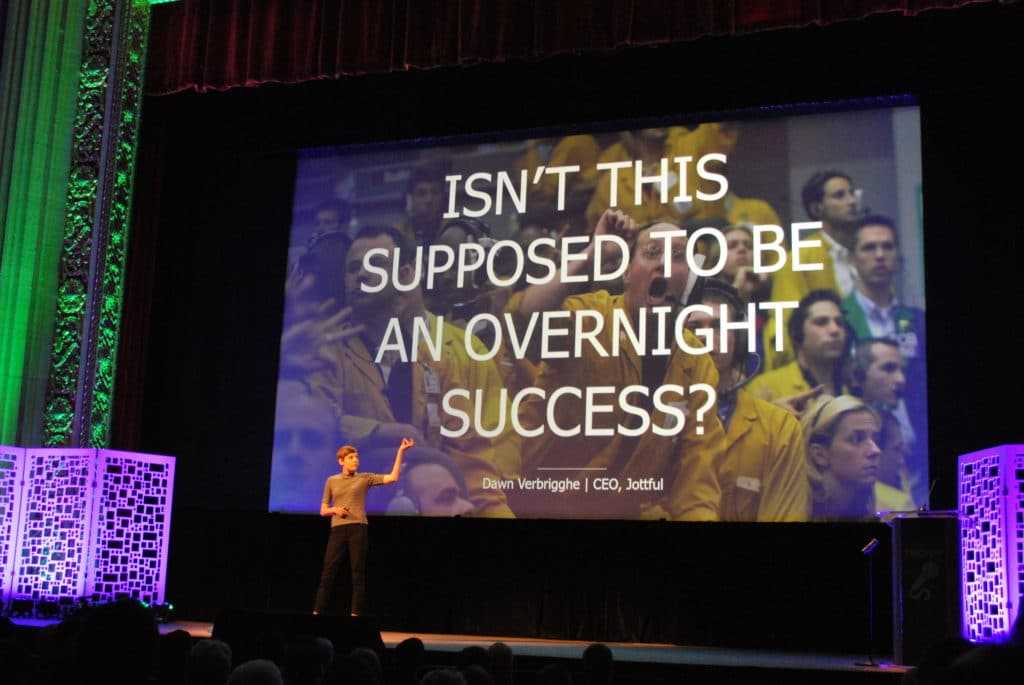"Isn't this supposed to be an overnight success?" asks CEO Dawn Verbrigghe of small business website and marketing startup Jottful at a2tech360's TechTalk last year.
Content marketing can be overwhelming for a business until the budget is there for bigger longterm communications programs. If you're a startup owner or solo marketing manager, you're already doing a lot with a little. But if you're building a company, the time is already here to get started on content marketing, because content marketing is a long game that takes time and is an integral part of brand building. Many startups give up too soon, but you can handle content marketing, whether you do it yourself or hire it out. It doesn't have to be fancy, but it does have to be focused in a few particular ways to succeed over time. You can start your own content marketing if you stay focused and don't let initial slow traction get you down.
Cronicle Consulting presents a short Content Series: 5 Ways To Start Content Marketing For Your Tech Startup. This series will be split into 5 sections so stay tuned for the next articles. First up, starting a company blog. It's the simplest way to start content marketing from day 1, and it will bring in results if you do it right. But most people don't know how to focus their blog for optimum results, so it feels like a waste of time. That's why we're here to help you avoid common content marketing errors before you begin. Note: SEO is its own important topic and won't be covered in the scope of this article.
Content Marketing Plan #1: Company Blog
Content marketing in a company blog not just about the content showing professional expertise or announcing company news. People want to know:
- what you're like to work with.
- how you view the world within your professional sphere.
- how you communicate.
Your blog is where prospective clients go to see how you interact with the world. When you start your company blog, begin by announcing the launch of the company. Then, tell your team story. Here are a few ideas to get started.
Content Marketing Ideas For A Blog
- tell your team story.
- talk about the problem your product or service is solving in the world or what cause you are supporting.
- announce new hires.
- post job listings.
- tell the story of company volunteering.
- publish white papers and awards.
- announce events and promotions.
- publish your own industry research reports or host your own awards.
- turn engineering expertise into mini e-books or published papers.
- host round tables interviewing industry experts.
- cover industry news.
If you need to hire your company blog out to a communications firm, check out their other client blogs and see if they are matching the tone and content to the industry and if they know their technical stuff in depth. If all the blogs for various clients in different industries sound the same or too high level, move on to a different firm. Tech startups in particular have this problem. Addressing it early can help you avoid wasting your efforts.
Pitch nights can be much more than an in-person event. These days they are competitions, media exposure, and an opportunity to create print content and a community that grows over time.
Tone, Focus & Style in a Company Blog
The tone of your company blog is critical: the vocabulary has to be right for the professional space being addressed, the focus of the content interesting to people in your field or your client space, and the communication style appropriate to your industry. Is the communication style in your space more formal or jocular? Is it interested in the broader social good, or does your circle tend to focus on technical details of research and problem solving industry issues? Once you get the hang of focus through trial and error and having someone with industry-specific content expertise create your blog, a company blog is one of the best ways to keep your website popping up in organic search results on topics potential clients are searching for, and you've pre-sold a lot of people on working with your team.
Appropriate Blog Tone Varies By Industry
We cannot emphasize enough getting the tone right. The problem with content marketing is that it falls to the marketing folks most of the time instead of an in-house journalist, which only larger companies have budget for. If you are a marketing manager versed in content that's great. If you're not sure if you're doing this correctly, one way to check is to make sure you don't use quite the same tone for sales copy as you do for the company blog. Think about the tone of how people within the organization communicate with each other and with clients, and use that as a guide instead. Why? Because it all begins to sound like a sales pitch otherwise, and that is not at all what content is for. Client storytelling works best when it's done in the tone that makes people sound the most professional, or the friendliest, or the best suited to solve a client's problems. Sales copy often accomplishes this only in direct pitches.
You Are Not The Hero Of The Story, You Are The Bard
Content is your chance to provide good will to the world, information for free that benefits them. The best way to do this is to talk about causes your company believes in, promote the good work of colleagues, and position yourself as the cheerleader to someone else as the hero of the story. If it starts to sound like "we have the best culture, look how amazing our culture is at this workplace here, check us out, guys" it's going to turn a lot of people off subconsciously to listening to what you actually have to offer. What you actually have to offer is a whole lot of wisdom and thought leadership that the world probably needs. The aim here is to tell the story you want to tell, but think of yourself as the support role or the cheerleader, not the hero. Just that simple shift will make your story sound so much more beneficial to the reader, and will cut out the feeling of awkwardness that can come from self-promotion.
Research reports also require funding, like this one from EntryPoint's Detroit Entrepreneurial Ecosystem report. Creating, publishing, or sponsoring a report like this can be very useful content.
Company Blog Style Is Tailored To The Blog's Purpose
Keep company blog content styled in a way that fits your brand and how you want to present your organization to the world. This often swings several directions off track.
Common Company Blog Errors:
- Your company blog sounds too much like a sales pitch for culture.
- Your company blog is all jargon and no specifics on your offerings.
- Your company blog is all about your company.
Number 1 depends on if you work in an industry that relies heavily on people's buy-in to a particular culture. Some company blogs do get away with a particular tone that sounds almost cultish, but often this is a turnoff for prospective hires and clients. To avoid this common mistake in a world of business websites that are nothing but culture pitch, focus on the benefit to the client. What do they want to know about? What are they searching for? What helps them? It's a great approach for creating content that people are more likely to be searching for anyway.
Number 2 is actually debatable. There are industries in which a jargon-heavy website is appropriate. "We deliver on deadline on spec with the most disruptive innovation imaginable." Except what do you deliver? Well, sometimes industries communicate exclusively in industry jargon, and that's properly communicating professional expertise and the right pitch. But it does wear thin on long-form content. If you work in an industry that's super jargon heavy, try to keep the jargon to the static pages, and the blog should go more in depth into what you're working on, as much as you can afford to share. Many industries such as automotive, advanced manufacturing, defense contracting, and the like are not able to publish the same kind of company blog because of NDAs and heavy restrictions on proprietary information. Biotech would be another good example. You want clients to know what you could offer them, but all details are often available in house after demos and personal contact with a client and most sales handled directly. In this case, if you still want to publish a company blog, keep it to the new hires, press releases, new services offered, and details of presentations from trade shows, which can be fun to read about.
Number 3 is tricky. Many company blogs don't have time to move past basic company press releases, but if you can make the time, reporting on industry news can be one of the most powerful ways to establish your company as an industry leader in the space. The style of your blog needs to be determined by whom you are serving. Biotech companies often focus very much on direct sales to clients, but a security startup needs to establish themselves as a leader in the industry thought leadership space. Their blog should be focused on industry standards, industry problem solving, and innovative solutions and conversations that serve the broader space.
But everyone's already doing this these days, right? Not quite. It takes a good marketing manager or journalist to spot the common flaw. Most company blogs talk about the company or their ability or authority to report on industry news far more than they produce actual content that is valuable to the reader. Journalism requires funding, and it doesn't come for free even if the cost is giving your marketing team space to produce quality content in house. This is where companies think content marketing doesn't work and tend to fall off over time to focus on other marketing. If your company promotes themselves as an industry thought leader but only talks about how central they are to the ecosystem and how many events they're hosting or attending to prove their relevance, they can come across as insecure or bragging or greedy, and that breaks reader trust. Instead, share news from colleagues in the space, build community good will, create round tables with experts that are normally hard to access, and do original reporting when possible so you're not competing time-wise with all the other blogs trying to do exactly the same work you're doing. If this is too challenging in the short term, the good news is that this is a very longterm strategy, and the easiest way to accomplish it is simply to budget out the time you do have for events and content over a longer time frame.
Awards won, statistics on how much your company has helped clients, or even hosting your own awards or publishing your own industry research reports or sponsoring them from industry groups can be great content.
Own Your Own Niche Content
Can't accomplish that much to start? Another way to accomplish this goal is to keep your focus niche on an area where you want to stand out as expert. That way, you don't have deadline pressure to keep up with the news like an investigative reporter, and your audience will come to identify you as an authority on a particular subject. Good examples of this include niche news sites, IT newsletters on a specific subject, or blogs from pitch competitions or Meetup groups that geek out on very specific topics.
Most company blogs should stick to what they have time for in their own niche. Only expand to covering industry news if you have staff that can stick with it and think critically to produce fact-checked content and original material whenever possible. This generally would take one or two people full time work to do a good job, which is why only larger companies can afford it. Reposting press releases is quick content, but if you want to really be seen as an industry thought leader, that company blog needs to be professionally edited, peer reviewed on technical articles, with as much bias rooted out as possible. This is a crowded space. Everyone has a blog and a podcast and a happy hour or social media group these days. But there is still plenty of opportunity for you to own your own niche. What makes your blog more than a bid for attention and sales? What makes your blog a real service to your clients? That's the content you need to produce, and yes, it takes budget and a whole lot of time. Content is no short solution. It's part of your company's interaction with the world that builds trust and visibility over time. If you struggle to create content quickly, there is no shame in hiring in a content expert. A quality journalist or content marketing manager can hone in on a strategy for you and create content magnitudes of order more quickly than you can do it all yourself.
If you need help setting up a communications strategy and content marketing plan, Cronicle offers tailored plans for small to medium sized tech-focused companies. We love creating content solutions for innovative companies doing good in the world, especially in the startup space. If you would like a free consultation on what you need to do to start your tech startup's content marketing, please email us for a no-obligation consult.
This is part 1 in a 5-part series on content marketing for tech startups. Next, check out part 2, all about guest posting and interviews.




